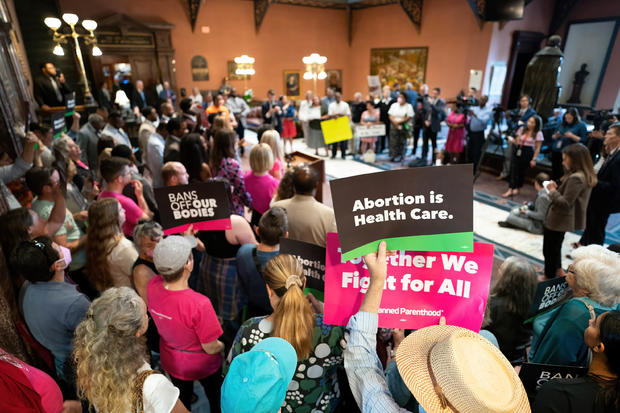The South Carolina Senate approved a bill Tuesday that would ban most abortions after around six weeks of pregnancy — before most people know they are pregnant — and sent it to the governor who has promised to sign it.
The proposal restores a ban South Carolina had in place when the U.S. Supreme Court overturned Roe v. Wade last year — a ban that, once it took effect, was overturned by the state’s highest court because it violated the state Constitution’s right to privacy.
Republicans have been searching for an answer to that ruling because it left abortion legal through 22 weeks of pregnancy and sharply increased the number of abortions taking place in South Carolina as most other Southern states enacted stricter laws.
The bill includes exceptions for fatal fetal anomalies, the patient’s life and health, and rape or incest up to 12 weeks. Doctors could face felony charges carrying two years imprisonment and a $10,000 fine.
“I look forward to signing this bill into law as soon as possible,” Republican South Carolina Gov. Henry McMaster tweeted Tuesday night.
Sean Rayford/SOPA Images/LightRocket via Getty Images
Republican Rep. Nancy Mace of South Carolina told CBS News last week that she opposes the bill, specifically citing its police reporting requirement for victims of sexual assault.
“I would not support this particular piece of legislation because of the police reporting requirements,” Mace said. “I’m a victim of rape myself. I was raped as a teenager at age 16. I couldn’t live with myself if I had to have it reported to police. Most rape victims do not report it. It’s an extremely traumatic experience. And to force that reporting to local sheriffs is wrong. It’s a non-starter.”
She was also critical of the bill’s 12-week abortion limit for victims of rape and incest, and noted that the bill requires that two doctors certify that exceptions have been met.
“It’s very difficult, especially those burdens on women and girls who’ve been raped or who are victims of incest,” Mace said. “That’s wrong. And that’s not where the majority of Americans are today, Republican or Democrat or independent. They’re not there with a six-week ban. They’re at 15 weeks. They’re at 20 weeks with exceptions.”
The Republican-led Senate’s opportunity to pass the bill came after the South Carolina House backed off a proposal to ban abortion almost entirely at conception. Senators had not been able to get the votes for that proposal after three different tries.
The vote also came after the three Republican women in the Senate urged the other members of their party to adopt a 12-week abortion ban as they fought additional restrictions one month after helping filibuster a near-total ban. They joined all Democrats in voting against the bill.
In blistering speeches, the three Republican women said the 12-week proposal did not give women enough time to make a decision, and they criticized changes like one requiring child support beginning at conception as ridiculous. Republican state Sen. Katrina Shealy endorsed the 12-week ban as a “real compromise.”
Republicans said they tweaked parts of the new law so it can pass judicial review. The author of the 3-2 state Supreme Court’s leading opinion overturning the ban was also replaced after she had to retire due to age.
Shealy and Republican state Sen. Penry Gustafson pushed back on assertions that they are not true Christians because of their positions.
“We in the South Carolina Legislature are not God. We do not know what’s going on in somebody else’s life. We do not have the right to make decisions for someone else,” Shealy said.
House Republicans also axed a section of the measure allowing minors to petition the court for an abortion up to 12 weeks of pregnancy.
Republican Majority Leader Shane Massey outlined new regulations and definitions inserted by the Republican-dominated South Carolina House last week during proceedings slowed by hundreds of amendments from Democrats across two days.
The women senators entered the State House together Tuesday to rousing cheers from the dozens of abortion rights supporters gathered on the main floor. All five donned buttons that read “elect more women.”
This week marks the fourth time that the chamber has taken up abortion since the U.S. Supreme Court overturned Roe v. Wade in June 2022. During last month’s filibuster, the five women criticized male leadership for repeatedly calling the debate. Speaking consecutively from the well, they at times talked about the physical changes that occur throughout pregnancy or highlighted separate issues they wanted to solve.
The Senate’s 15 Democrats, unified against both abortion bans, have largely let the Republican majority debate the issue among themselves. Opponents argue that South Carolina’s high maternal mortality rates — with even poorer outcomes among Black patients — would grow worse under the new restrictions.
Abortion currently remains legal through 22 weeks in South Carolina, though other regulations largely block access after the first trimester at the state’s three clinics. But the law has gone unchanged amid a Republican disagreement over how far to restrict access that has only recently moved toward resolution.
Republican leaders have noted provisional state Health Department data that show rising numbers of abortions in South Carolina.
The action comes one week after Republicans in the North Carolina General Assembly moved to enact a 12-week abortion ban by overriding the Democratic governor’s veto — pushing Virginia closer to being the last state in the region with relatively easy access.
Lawmakers anticipate legal challenges for any ban that ultimately becomes law. The South Carolina Supreme Court overturned a similar 2021 law as a violation of the state constitution’s right to privacy in a 3-2 decision this January. But many Republicans believe the latest version would stand after changes to both the proposal’s language and the court’s makeup.
 Latest Breaking News Online News Portal
Latest Breaking News Online News Portal






